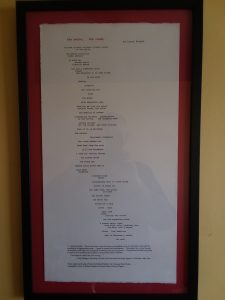
An interview with CSULB professor, Dr. George Hart, on enabling activism in everyone.
By Morgan Barragan
If environmental issues affect us all, wouldn’t a wise solution be to include everyone in environmental activism?
Dr. George Hart, a Professor of English at California State University, Long Beach, teaches the importance of fortifying our relationship to the environment as well as identifying our place in the ecosystem at large. Dr. Hart’s teachings reach beyond his students through his books on ecocritical writers (authors that write through the lens of environmental concern).
“Everything has a place. Everything has a role,” reflects Dr. Hart.
I originally reached out to Dr. Hart to interview him on his most recent publication, Finding the Weight of Things: Larry Eigner’s Ecrippoetics. I was fascinated by Dr. Hart’s focus on Larry Eigner, an American ecopoet living with Cerebral Palsy, as a model for our own ability to make a positive environmental change.
Dr. Hart told me the inspirational story of a man using only his thumb and index finger (as this was the mere movement his disability allowed) to bring awareness and positive change to a global issue.
Larry Eigner jumped at the chance to read science magazines, news articles, and environmental literature to bolster his ecological knowledge. Existing evidence and incoming current events piqued Eigner’s fascination with climate change and inspired his poetry. His poetry has made intimidating climate issues transform into more palatable human issues.
Eigner’s story is one of hope. There is hope in everyone’s ability - no matter what that ability may be - to make change. If you have the ability to show up to beach clean ups, great! If you can read a book centered on the environment, awesome! If you can take a trip to your local park and birdwatch, amazing! Your actions - no matter the size - matter. Your actions make a difference.
As Dr. Hart explains, “We each have our niche, we can make a collective effort.”
For Dr. Hart, making change means teaching literature to a diverse group of students and studying ecocritical authors. He says, “Literature, creative writing, imaginative writing has a huge role in helping us deal with the issues that are coming towards us - especially when it comes to climate change and mass extinction … We need to have really strong imaginations to deal with these issues.”
He establishes, “The science is there to help us figure out what to do. The engineering is there to help us do it and get it done. But, the ideas and imaginations come from literary people and artists and creative people and activists.”
We must remember that we as individuals each play a vital role in the global ecosystem. We don’t need to be experts on environmental issues to have an impact; we need to do what we can.
Everyone belongs in the fight for our planet. Everyone has their strengths. Everyone has their interests. Play into your strengths, interests, and imaginations! If Eigner can do it, so can you!
In the spirit of Surfrider’s mission to save the ocean, Dr. Hart provided an ocean poem by Larry Eigner. See below the poem and the printed copy that hangs on his wall in his home.
the music, the rooms
silence silence silence silence sound
on the walls
the beach raveling
times advance
or back up
around earth
electric poles
the sun a reflected color
tropic
how distance is to some birds
in the wind
fishing
pinpoint
the circling air
food
the power
with desperate ease
food for me hits the water
without break, the cries
the meaning of change
information shifted, player piano
on the screen, the swimming moon
enters eclipse
out the window, and other station
none of us is watching
the cabinet
directed
instrument forgotten
the clock shakes out
head bent from the wing
in a live broadcast
a case for various things
dry grassy fields
the blank sky
wampum gulls broke shells
such eyes
a malnutrition
Kenya
straightens hair it turns blond
scurvy is wiped out
the dogs come, the group
the street comes
the North Sea
studio on a ship
pivot spun
dark life
leaving the island
the dim expanding miles
on bikes
rises
the mist like a magnet
nest in fisherman’s pocket
a steady white light
they might drive headlong into
blows lost bearings
the wash
“ ... distant thunder ... Nearer and nearer came the strange commingling sound
of sleigh bells, mixed with the rumbling of an approaching storm ... I gazed
in wonder and astonishment ... They passed like a cloud through the branches
of the high trees, through the underbrush and over the ground ... They flut-
tered all about me; gently I caught two in my hands and carefully concealed
them under my blanket.
I now began to realize they were mating ... ”
-- Chief Pokagan, describing an onset of the now extinct passenger, in Michigan, May 1850

